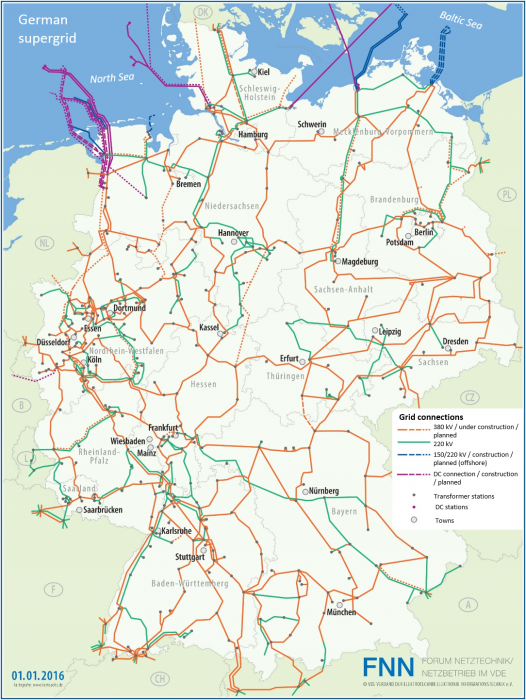Hinkley Point criticism / Court blocks transmission line
Süddeutsche Zeitung / Greenpeace Energy
“Flawed subsidies”
Britain is planning a different kind of energy transition, writes Björn Finke in the Süddeutsche Zeitung. While they want to shut down all coal-fired power stations by 2025, new power is to come from nuclear plant Hinkley Point C, for which the British government is guaranteeing a high feed-in tariff for 35 years amounting to 108 billion euros, a new study by Energy Brainpool for Greenpeace Energy finds. The study says that the country could achieve the same amount of reliable power using new renewable sources and natural gas plants for less money (101 billion euros). Instead, the government cut subsidies for renewables, the author says. Unlike in Germany, most British citizens still support nuclear power, but Greenpeace Energy has launched a lawsuit against the Hinkley Point subsidies at the European Court of Justice.
Download the Greenpeace Energy study in English here.
Handelsblatt
“The hindsight of Sigmar Gabriel”
Energy minister Sigmar Gabriel’s call to strengthen market forces in the energy market is the right move and a declaration of war for renewable energy producers, says Jürgen Flauger in an opinion piece in business daily Handelsblatt. “But this realisation comes very late – probably even too late. The energy market has become so distorted by intervention, laws, and decrees that it doesn’t produce reliable price signals,” he writes. Flauger argues the government’s energy policy put climate protection first for years, at the expense of costs and supply security. “It’s time to finally find a balance. Gabriel has to put his money where his mouth is.”
Read the comment in German here (behind paywall).
Süddeutsche Zeitung
“Learning from Germany”
Renewables cost consumers 24.1 billion euros in 2015, but these numbers are deceptive, writes Michael Bauchmüller in the Süddeutsche Zeitung. The highest costs came from the oldest renewables facilities, which were installed when the technology was still expensive. When prices for solar panels dropped, many Germans installed even more of them, knowing they would get the generous feed-in tariffs for 20 years. It’s those installations that are boosting the cost of the energy transition, not new wind parks and photovoltaics installations being built today – at a far lower cost than new nuclear power plants.
NaturEnergiePlus
“Germans connect the energy transition mainly with the development of renewables”
Asked for their spontaneous association with the term “Energiewende”, a majority of Germans (57%) connect it with the development of renewables like wind and solar power, a poll by Forsa commissioned by green power provider NaturEnergiePlus showed. Fewer participants connected it to the exit from nuclear power and even fewer with energy efficiency.
Read the press release in German here.
rbb
Court blocks important transmission line for environmental reasons
An important transmission line to transport wind power to Germany’s capital Berlin has been blocked by a court, reports regional broadcaster rbb, who called the power line “one of the most important building projects of the Energiewende in the state of Brandenburg”. The court said environmental aspects had been neglected during the planning procedure. Environmental NGO Nature and Biodiversity Conservation Union (NABU) had argued the powerline could endanger rare birds. Underground cabels might be an alternative, but grid operator 50Hertz says they are much more expensive and might also cause legal problems, according to the report.
Find the article in German here.
VDE
Grid planning overview
The Association for Electrical, Electronic & Information Technologies (VDE) has published an updated map of Germany's supergrid, including all power connections with 380 and 220 kV of the four grid operators 50Hertz, Amprion, Tennet and TransnetBW. Grid projects under construction and those that are in advanced planning stages are also included.

